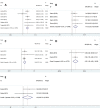BRCA2 mutations should be screened early and routinely as markers of poor prognosis: evidence from 8,988 patients with prostate cancer
- PMID: 28410213
- PMCID: PMC5522317
- DOI: 10.18632/oncotarget.16712
BRCA2 mutations should be screened early and routinely as markers of poor prognosis: evidence from 8,988 patients with prostate cancer
Abstract
The aim of this study was to focus on clinicopathological characteristics and prognosis in men with prostate cancer (PCa) harboring a breast cancer 2 (BRCA2) gene mutation and to offer convincing evidence to consider BRCA2 mutation as a marker of poor prognosis in the molecular classification of PCa. We searched relevant articles from PubMed, Embase, Web of Science, and the Cochrane Library databases to evaluate the differences in the overall survival (OS) and cancer-specific survival (CSS) between BRCA2 mutation carriers and non-carriers in patients with PCa. We included 525 BRCA2 mutation-carriers and 8,463 non-carriers in total from 10 studies in our meta-analysis. The results showed that carrying a BRCA2 mutation was correlated with a reduced CSS and OS when compared with that of non-carriers, with pooled Hazard Ratios (HRs) of 2.53 (95% confidence interval (CI): 2.10-3.06, P < 0.001) and 2.21 (95% CI: 1.64-2.99, P < 0.001), respectively. The results also demonstrated that BRCA2 mutation-carriers harbored a higher Gleason Score (GS) (> 7), TNM stage (> T3, N1, M1), and risk level than non-carriers. Our meta-analysis showed that a BRCA2 mutation predicted poor survival outcomes in patients with prostate cancer, especially in those undergoing treatments with radiotherapy. Therefore, the use of BRCA2 mutation as a clinical prognostic factor could help stratify the high-risk patients and provide clinical strategies for more effective targeted treatments for patients with prostate cancer.
Keywords: BRCA2; molecular classification; mutation; prostate cancer; survival.
Conflict of interest statement
The authors declare no conflicts of interest.
Figures





References
-
- Miller KD, Siegel RL, Lin CC, Mariotto AB, Kramer JL, Rowland JH, Stein KD, Alteri R, Jemal A. Cancer treatment and survivorship statistics, 2016. CA Cancer J Clin. 2016;66:271–289. - PubMed
-
- Attard G, Parker C, Eeles RA, Schroder F, Tomlins SA, Tannock I, Drake CG, de Bono JS. Prostate cancer. Lancet. 2016;387:70–82. - PubMed
-
- Breast Cancer Linkage Consortium Cancer risks in BRCA2 mutation carriers. J Natl Cancer Inst. 1999;91:1310–1316. - PubMed
Publication types
MeSH terms
Substances
LinkOut - more resources
Full Text Sources
Other Literature Sources
Medical
Miscellaneous

